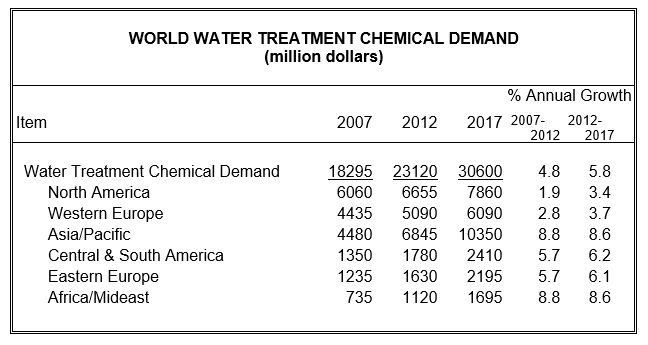World demand for water treatment chemicals is forecast to rise 5.8 percent per year to $30.6 billion in 2017. Demand will be driven by rising water quality standards in manufacturing and other industrial applications, expanding access to safe drinking water in underserved regions, and a shift toward higher value chemicals with improved performance and/or environmental profiles, particularly in developed countries.

According to Freedonia analyst Emily Park, ?Advances will be the fastest in developing parts of the world -- particularly the Asia/Pacific and Africa/Mideast regions.? Increases in developed countries will be tempered by greater competition between water treatment chemicals and equipment in some applications, reflecting a more complex industry response to environmental concerns. These and other trends are presented in World Water Treatment Chemicals, a new study from The Freedonia Group, Inc., a Cleveland-based industry market research firm.
In countries in developing regions, rising standards for industrial water quality and the adoption of more complex manufacturing processes, along with healthy economic expansion, will drive strong growth in demand for water treatment chemicals. In many developing countries, the use of water treatment chemicals has historically been low relative to use rates seen in manufacturing and industrial markets in more affluent areas, and rising water treatment chemical use rates will be reflective of greater reliance on both commodity-type chemicals and specialty chemicals. The increased use of water treatment chemicals in these regions will be supported by manufacturers? efforts to remain competitive by improving the quality of finished products, which can be directly impacted by water quality.
In developed areas -- such as the US, Western Europe, and Japan -- where the use of water treatment chemicals is well-established, growth in demand is expected to be more moderate and the shift in product mix will be more complex. Higher industrial water quality standards and environmental regulations are expected to contribute to rising demand for water treatment equipment, which can be used to partially replace some types of chemicals such as biocides. On the other hand, water treatment equipment can also support the use of higher value specialty corrosion inhibitors, scale inhibitors, and coagulants and flocculants, which can improve equipment function and prevent damage to equipment.





